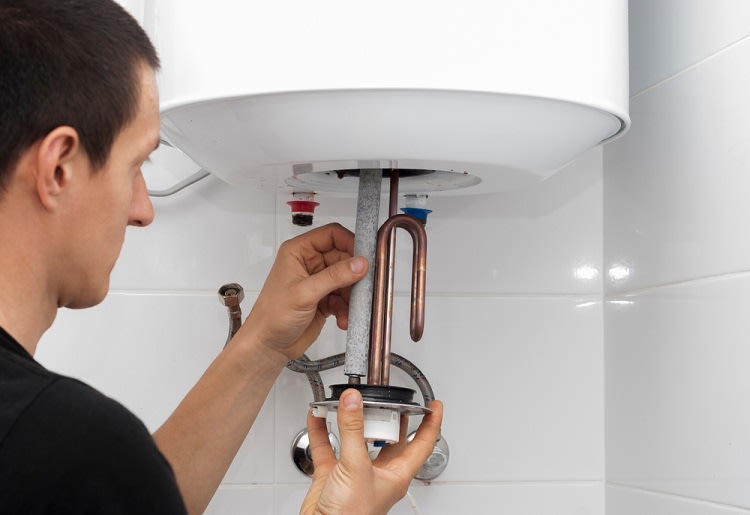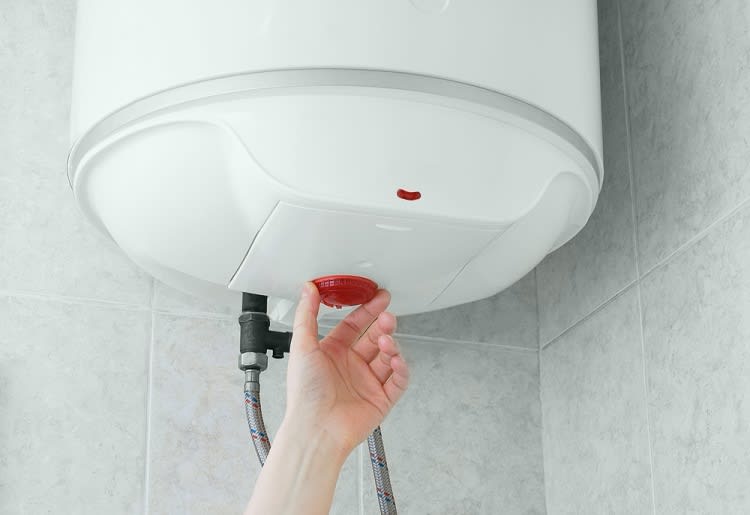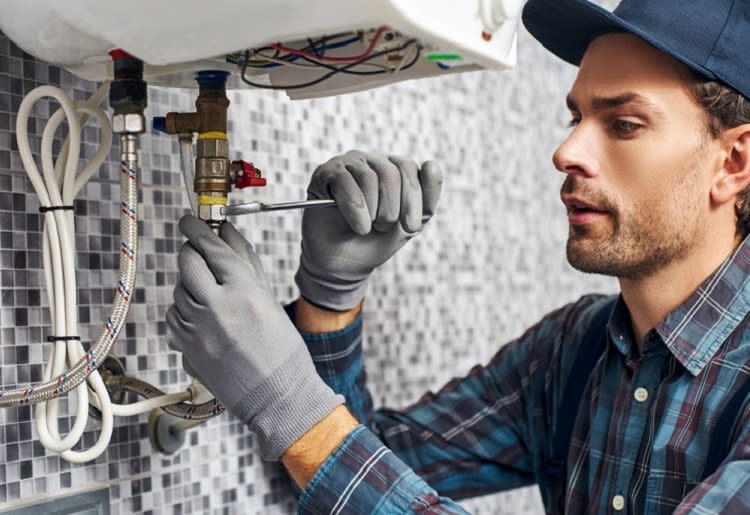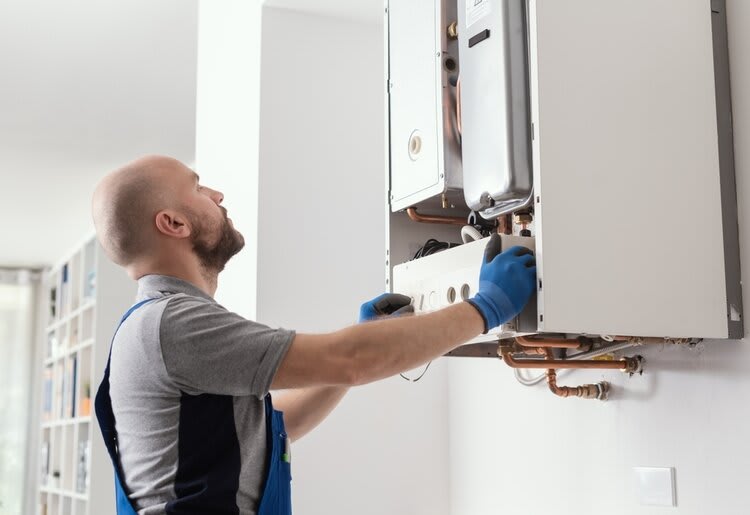A water heater leak can cause significant damage to your home. Taking proper care of your water heater and investing in a good home warranty can help you avoid costly repairs and replacements down the road. Luckily, we've rounded up 10 tips to help you keep your water heater properly maintained.
Let's dive in!
» Looking for a reliable home warranty plan? Check out our top picks for the best home warranty companies.
1. Check the Temperature Setting
One of the most important things you can do to prevent your water heater from leaking is to check the temperature setting. The ideal setting for most homes is between 120 and 140 degrees.
If your water heater is set any higher than that, it's at risk of overheating and developing a leak. So, be sure to check your water heater's temperature setting and adjust it as needed.
2. Check the Anode Rod
The anode rod is a sacrificial piece of metal located inside your water heater. Its job is to protect the steel tank from corrosion. Over time, this rod can corrode inside the tank. This is why it's important to check it regularly and replace it if necessary. If you don’t, the tank could eventually rust and leak.
Replace your anode rod if you notice any of the following warning signs:
- Your hot water smells like rotten eggs
- Your water is discolored or brown
- Your water smells rusty
- Your water heater is leaking
Replacing the anode rod is a simple and inexpensive way to extend the life of your water heater. To replace it, simply unscrew the old anode rod and screw in a new one. You can find replacement anode rods at most hardware stores, including Home Depot and Lowes.
» Check out these other important home plumbing tips.

3. Flush Your Tank
Over time, sediment will settle at the bottom of your tank, causing problems with your system's efficiency. To prevent this, you should flush your tank every few months.
This process is simple and only takes a few minutes. Just attach a garden hose to the drain valve at the bottom of your tank and open the valve. Then, let the water run until it's clear. Be sure to close the valve when you're finished.
4. Inspect Your Tank for Leaks
It's important to regularly inspect your tank for any signs of leaks or other damage. If you find a leak, it's important to have it repaired immediately by a qualified technician.
To inspect your tank, simply look it over for any signs of water damage. You should also feel around the tank for any wet spots. If you have an electric water heater, be sure to check the wiring for any signs of damage, as this can be a potential electrical hazard.
» Struggling with water damage? Use these tips to deal with water damage quickly.
5. Know the Warning Signs
Several warning signs indicate your water heater needs repair or replacement, such as strange noises coming from the unit, wet spots on the floor around the unit, or rust-colored water coming from the faucets.
If you spot any of these signs, your water heater could need repairing or replacing. And if you have one of the best home warranties for HVAC and water heaters, you may not have to pay for repairs yourself. Your home warranty plan may cover these out-of-pocket costs.
6. Maintain a Proper Water Level
Too much or too little water can put stress on the tank and cause premature failure. Check the manufacturer's manual for specific guidance on the optimum water level for your particular model. Tankless water heaters may also require occasional descaling to remove mineral buildup.
» Learn how to take better care of your plumbing with these tips.

7. Don't Ignore Strange Noises
Some of the most common noises you might hear include popping, banging, or hissing. These noises are usually caused by sediment build-up in the tank. When the water is heated, the sediment expands and can cause these types of noises.
If you hear any strange noises coming from your unit, it's important to have it checked out by a professional as soon as possible, as these could indicate a serious problem.
8. Test Your Pressure Relief Valve
The temperature and pressure (T&P) relief valve is an important safety feature on your water heater. It's designed to relieve pressure and prevent your water heater from overheating. If this valve isn’t working properly, your water heater could build up a dynamite stick’s worth of pressure. Not good.
You should test this valve monthly to ensure it's working properly. To test it, simply lift the lever and allow water to flow out. If water doesn't flow out or the valve doesn't close properly, it must be replaced.
» Looking for plumbing coverage with a home warranty? Here are a few factors to consider first.
9. Install a Water Alarm
A water alarm is a simple device that can detect leaks in your unit and shut the water off automatically to prevent further damage. This is a great way to protect your home from water damage in the event of a leak.
You can pick up a water alarm from most hardware stores, including Home Depot and Lowes. In most cases, all you'll need to do to install it is place it on the floor near your water heater.
10. Schedule Regular Maintenance Checks
Just as you should have regular HVAC maintenance done, you should also have your water heater serviced by a qualified technician on a regular basis. This helps your water heater run smoothly and allows you to catch any potential problems before they become serious.
Most manufacturers recommend having your unit serviced every six months to a year. However, if you have hard water, you may need to have it serviced more often or install a water softener. Regular maintenance will prolong the life of your water heater and save you money in the long run. Don't wait until there's a problem to call a plumber; regular check-ups will keep your system running smoothly for years to come.
» Check out a few more essential skills every homeowner should master.

Be Proactive About Water Heater Maintenance
A water heater is a vital appliance in every home. It provides hot water for cooking, cleaning, and bathing. A broken water heater can be a major inconvenience and lead to expensive repairs. That's why it's important to perform regular maintenance on your water heater to prevent leakage—and have a top-rated home warranty to help foot the bill.
Think about it: Water heater repairs can be costly. If you think you won’t be able to afford repairs or replacements on your own, invest in a top-rated home warranty.
» Select Home Warranty and First American Home Warranty offer reliable home warranty plans.

